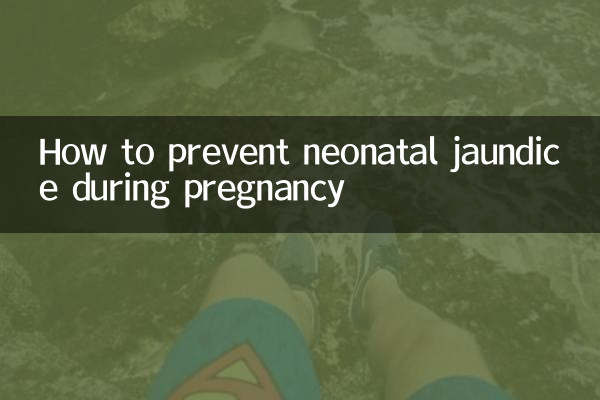How to prevent neonatal jaundice during pregnancy
Neonatal jaundice is a concern for many newbies, especially understanding preventive measures in advance during pregnancy, which can effectively reduce the risk of jaundice after birth. The following is a summary of the popular topics on the Internet on the prevention of neonatal jaundice during pregnancy in the past 10 days. Combined with scientific suggestions and structured data, we will help expectant mothers do a good job in prevention.
1. Causes of neonatal jaundice

Neonatal jaundice is caused by abnormal bilirubin metabolism, which leads to yellowing of the skin, mucous membrane and sclera. It is mainly divided into physiological jaundice and pathological jaundice. Physiological jaundice is more common and usually does not require special treatment; while pathological jaundice requires timely medical treatment.
| Types of jaundice | Features | Common reasons |
|---|---|---|
| Physiological jaundice | Appears 2-3 days after birth and disappears 7-10 days after birth | Newborn liver immature |
| Pathological jaundice | Early appearance (within 24 hours), long duration, high bilirubin level | Maternal and infant blood type incompatibility, infection, genetic metabolic diseases, etc. |
2. How to prevent neonatal jaundice during pregnancy
1.Eat reasonably
Diet during pregnancy is crucial for fetal liver development. It is recommended to consume more foods rich in vitamin C, E and folic acid, such as leafy green vegetables, fruits and whole grains, to avoid high-fat and high-sugar foods.
| Recommended food | effect |
|---|---|
| Spinach, broccoli | Rich in folic acid, promoting fetal liver development |
| Oranges, kiwis | Vitamin C enhances immunity and reduces risk of infection |
| Nuts, olive oil | Vitamin E antioxidant, protects liver cells |
2.Regular prenatal inspection
Regular examinations during pregnancy can promptly detect problems such as maternal and infant blood type failure and infection. Doctors will take intervention measures according to the situation, such as injection of immunoglobulin.
3.Avoid infection
Pregnancy infections (such as rubella, cytomegalovirus) may increase the risk of neonatal jaundice. Expectant mothers should avoid contact with the source of infection, pay attention to personal hygiene, and receive related vaccines.
4.Maintain good living habits
Quitting smoking and drinking, regular work and rest, and moderate exercise will help the fetus develop healthily and reduce the probability of jaundice.
3. Postpartum precautions
Even if you are prevented during pregnancy, you still need to pay attention to jaundice after birth:
| measure | illustrate |
|---|---|
| Start milk as soon as possible | Promote fetal discharge and reduce bilirubin reabsorption |
| Sufficient feeding | Breastfeed 8-12 times a day to avoid dehydration |
| Sunbathing | 10-15 minutes a day (avoid direct eye shot) |
4. The situation where medical treatment is needed
If your baby has the following symptoms, you should seek medical attention immediately:
- Jaundice appears within 24 hours of birth
- Jaundice rapidly worsens or spreads to the hearts of the hands and feet
- Accompanied with symptoms such as fever, milk refusal, and drowsiness
Through scientific prevention during pregnancy and close observation after childbirth, most neonatal jaundice can be effectively controlled. Expectant mothers do not need to be overly anxious, but they must also be vigilant and protect their baby's health.

check the details

check the details